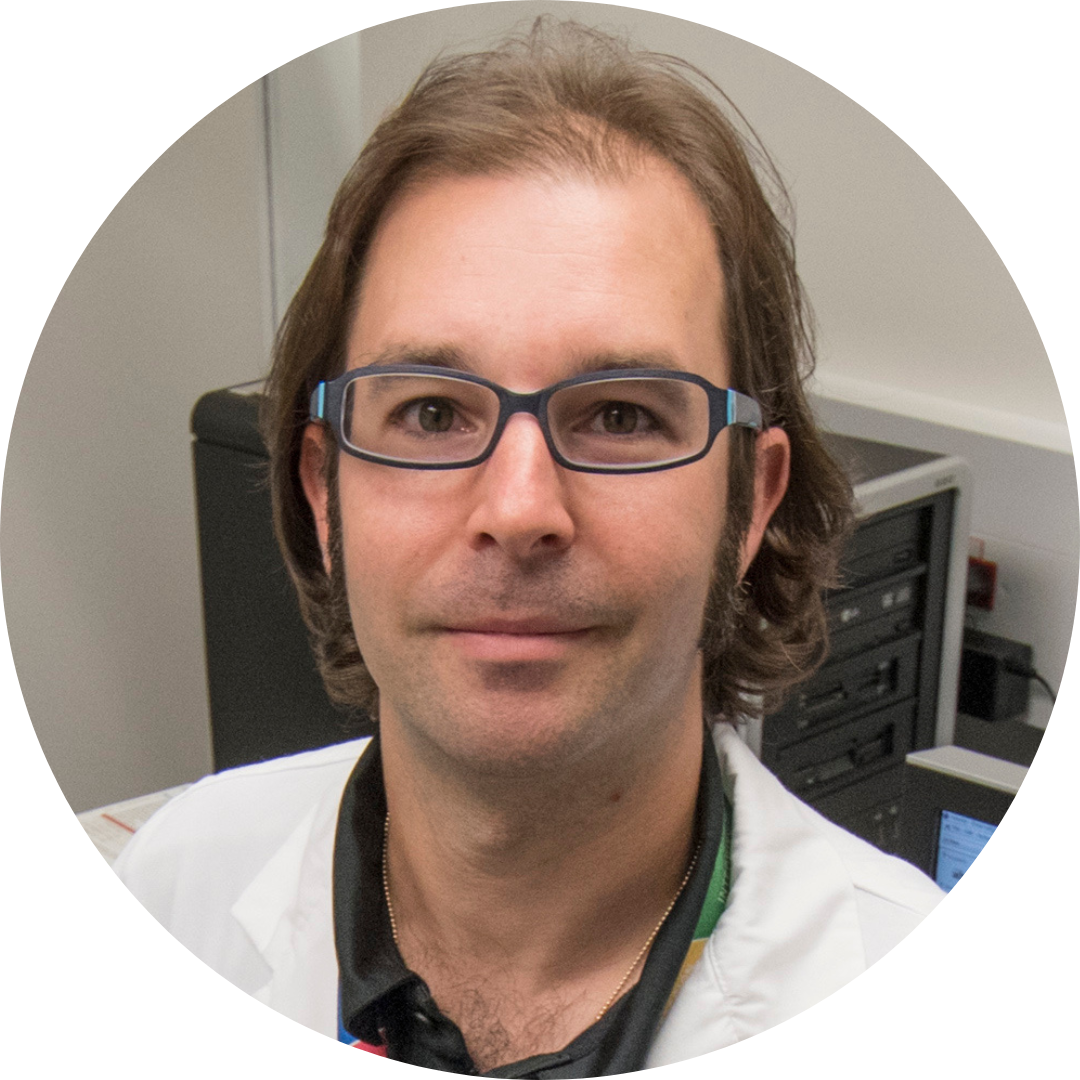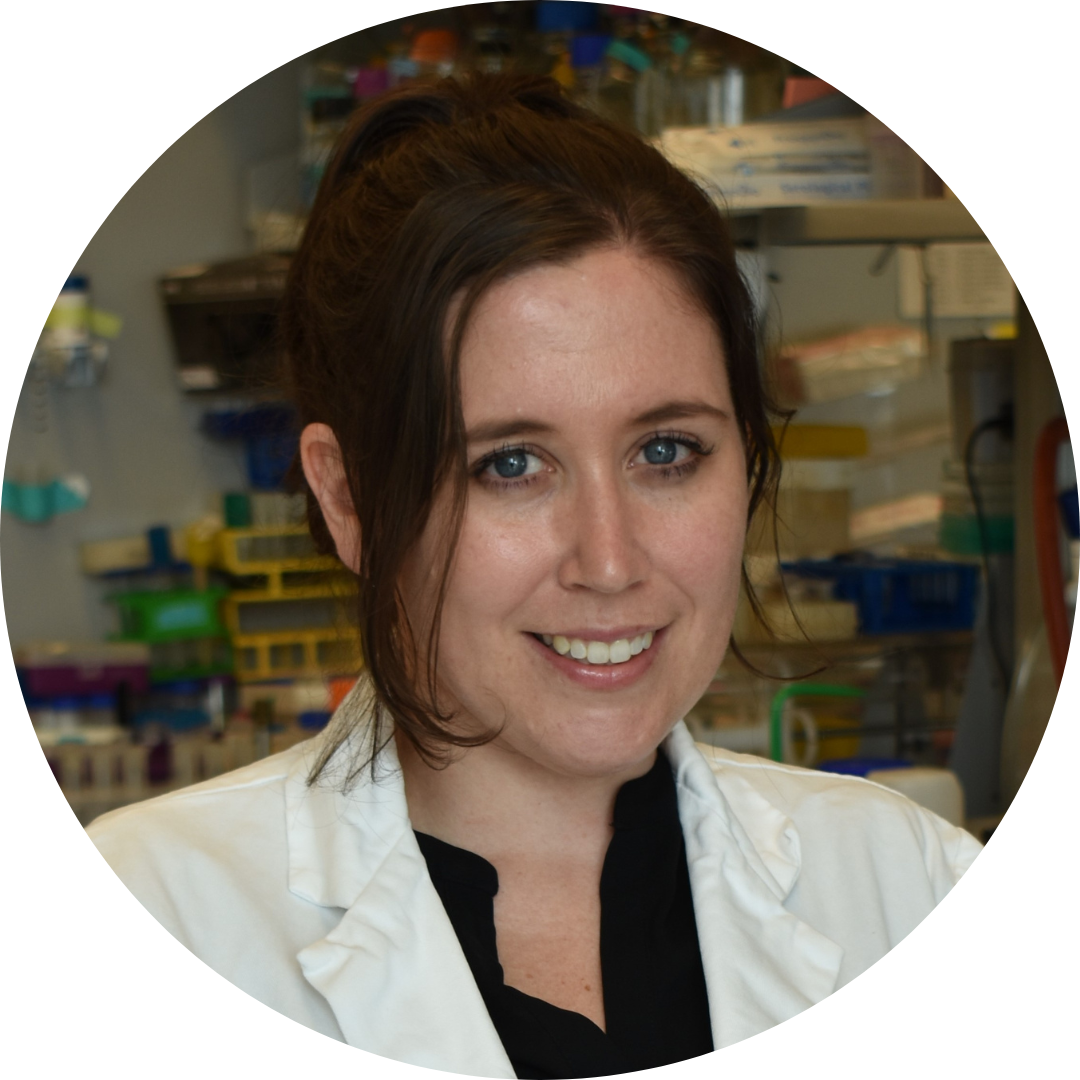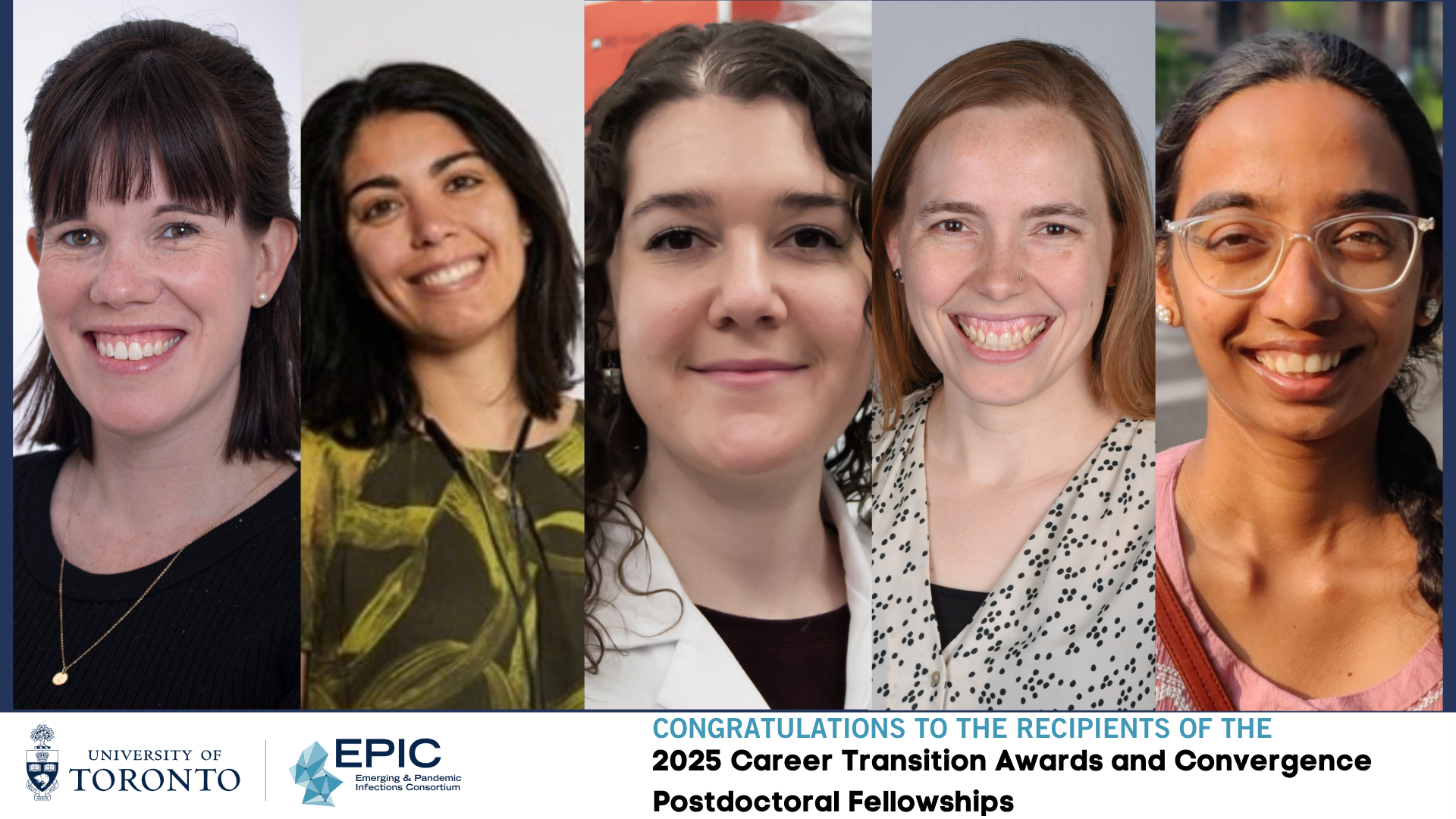Results of the Career Transition Awards Competition
The Emerging and Pandemic Infections Consortium (EPIC) is an integrated network for researchers, trainees and partners working to confront infectious disease challenges. We unite members across the University of Toronto and its hospital partners to accelerate cross-disciplinary work in the understanding and development of new countermeasures against pathogens. A key pillar of EPIC’s work is training the next generation of infectious disease research leaders that will help stop future pandemics and reduce the societal burdens of infectious disease.
EPIC Career Transition Awards support postdoctoral trainees and research associates who are ready to lead an independent project. The awards will establish a discrete fund for the recipient to facilitate an achievable, small-scale project led entirely by the applicant, while being mentored by their supervisor and a dedicated mentor in the EPIC community. This work is intended to become a cornerstone of their independent program as they develop the next stages of their career.
We are pleased to share the results of our Career Transition Awards competitions.
2025 Career Transition Awards recipients

Clare Burn Aschner
The Hospital for Sick Children
Supervisor: Jean Philippe-Julien (The Hospital for Sick Children)
Project title: Effector antibody-mediated protection against human cytomegalovirus in neonates
Project summary
Human cytomegalovirus (HCMV) affects as many as 1 in every 150 live births and poses a significant challenge to maternal and child health, as it can result in long-term health implications for babies, including hearing loss and neurodevelopmental disorders. Existing drug treatments are not effective in treating or preventing HCMV infection in newborns, and there is currently no available effective vaccine. Past vaccine studies have shown that the traditional neutralizing antibody response targeting important viral proteins fails to protect against infection and disease, but there is some clinical evidence for a different kind of immune-activating antibody mediating protection in humans.
This work will determine the role of immune-activating antibodies targeting HCMV and their ability to cross the placenta to protect babies from infection before birth. This study will use antibody engineering techniques to modify HCMV-specific antibodies, enhancing their ability to activate the immune response and cross the placental barrier to be delivered to the site of infection. By investigating the role of these antibodies in protection, the goal of this study is to contribute to the development of new preventative and treatment options for HCMV in pregnant people and newborns, and to inform the future development of maternal vaccine candidates for HCMV. This work would benefit other important diseases in newborns, and improve our understanding of how to effectively generate and target functional antibodies to the site of infection.

Kirsten Meyer
Department of Biochemistry, Temerty Faculty of Medicine
Supervisor: Justin Nodwell (Department of Biochemistry, Temerty Faculty of Medicine)
Project title: Learning from the experts – turning natural antimicrobial extracellular vesicles into targeted drug delivery systems against resistant pathogens
Project summary
In the environment, microbes have evolved sophisticated mechanisms for competition with each other. Streptomyces bacteria make many natural antimicrobials that we have adapted as antibiotics and antifungals for the clinic. Fascinatingly, I have found that Streptomyces release many of their antimicrobials inside little packages – extracellular vesicles. These vesicles then act as a delivery system of the antimicrobials to other microbes. Importantly, this increases the efficacy of the antimicrobials and counters antimicrobial resistance. The vesicle is able to fuse with the membrane of the microbe and achieve direct delivery of a cocktail of antimicrobials into the cell.
We want to understand how this natural delivery system works – the macromolecules, proteins and lipids, that are important for the antimicrobial vesicles to be made, and the macromolecules important for delivery of the antimicrobials to other microbes of interest. The first step is identifying the proteins and lipids present in the vesicles. The second step is to use bioinformatic, genetic, and microscopy tools to investigate their roles in vesicle function. Understanding these mechanisms will enable us to develop bioengineering tools for the bacterial extracellular vesicles, and importantly to learn the vulnerabilities of microbial membranes for achieving targeted drug delivery into the cell. We can then take these mechanisms from this evolved competition strategy and adapt them to develop targeted drug delivery systems that improve killing of antimicrobial resistant pathogens.
2024 Career Transition Awards recipient

Michelle Olding
Dalla Lana School of Public Health
Supervisor: Carol Strike (University of Toronto, Dalla Lana School of Public Health)
Project title: Sustaining and improving HIV and HCV prevention, testing, and treatment outcomes: Using implementation science to study safer supply programs
Project summary
People who use drugs (PWUD) experience a high burden of HIV and Hepatitis C, yet face challenges accessing evidence-based care. Prescribed safer supply (PSS) programs are one innovative model that shows promising evidence of improving HIV/HCV prevention, testing and treatment outcomes among the most marginalized and hardest-to-reach populations of PWUD. PSS programs deliver low-barrier and comprehensive health and social care to PWUD (e.g. primary care, infectious disease treatment, mental health counselling, housing support), alongside provision of prescribed pharmaceutical grade medications as a safer alternative to the toxic unregulated drug supply. PSS have promising potential to advance infectious disease prevention and health promotion for PWUD, but face major barriers to long-term sustainability and scale-up. Using an implementation science framework and mixed-methods approaches, this study will explore contextual factors theorized to influence the sustainability of PSS programs and related infectious disease outcomes. Research will be conducted at a Health Canada-funded prescribed safer supply program. Data collection will include quarterlyextracts of program-wide indicators, participant observation, surveys, and in-depth interviews with PSS prescribers and clients over a one year period when they will be transitioning from a pilot phase (funded by Health Canada) to long-term sustainability. This study will generate timely and actionable evidence to inform sustainability planning at this critical juncture, including guidance on how PSS programs may be sustained within pilot organizations and scaled-up within the broader health system.
2023 Career Transition Awards recipients

Michael Litvack
Hospital for Sick Children
Supervisor: Martin Post (Hospital for Sick Children)
Project title: Using stem cell-derived macrophages to combat pulmonary viral infections
Project summary
Influenza A Virus (IAV) – or more simply “flu” – is the primary infectious agent that causes our seasonal flu outbreaks and can lead to pandemic level health emergencies due to seasonal strain changes and lack of population immunity to them. Though advances have been made over decades to supply health care systems with vaccines, very few new disease treatments or preventions have been established. My project focuses on a new experimental approach whereby we have developed a specialized immune cell from stem cells – specifically adapted to function in the lungs – that inactivates respiratory viruses in viral lung infections and reduces viral lung disease in animal experiments. For this project, I am seeking to test the ability of this special stem cell-derived immune cell to inactive the flu virus and reduce respiratory disease in experimental animals infected with flu (IAV). I plan to test and compare how these cells inactivate different strains of flu. By researching these cells in experimental animals and then translating our knowledge of them to the human immune cell counterpart we will be able to understand the mechanisms by which these cells inactivate respiratory viruses. This information can be used to modify the cells to create viral therapeutics that reduce respiratory viral diseases in humans, including the virus that causes COVID, and lower the burden on health care systems. This project will establish the research platform from which I will broaden its application during my future career development.

Véronique Taylor
Department of Biochemistry, Temerty Faculty of Medicine
Supervisor: Karen Maxwell (University of Toronto, Temerty Faculty of Medicine)
Project title: The impact of bacterial cell signalling on anti-phage defence in Pseudomonas aeruginosa
Project summary
Bacteria are becoming increasingly resistant to antibiotics, leading to 1.27 million deaths worldwide this year. There is an urgent need to develop effective new treatments for these infections. Bacteriophages, small viruses that are natural predators of bacteria, provide an attractive alternative for therapeutic use. However, as bacteria encode many defence systems to protect them from phage infection, a more thorough understanding of phage-bacteria dynamics is required before they can be effectively deployed. My work will focus on Pseudomonas aeruginosa, a notoriously difficult to treat human pathogen. I will create a comprehensive library of all anti-phage defence systems in P. aeruginosa, and these systems will be monitored for changes in expression in the presence of bacterial signaling molecules. This will establish whether bacteria communicate to warn each other of impending phage infection, and if those signals drive expression of anti-phage defence systems. This is the first comprehensive study to examine how bacteria respond to phage infection and ultimately protect themselves. The knowledge gained in this study will allow us to develop highly effective phage therapy treatments.




